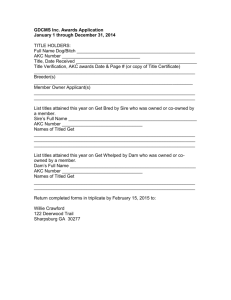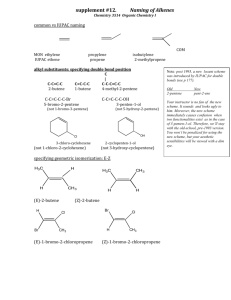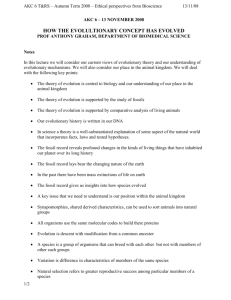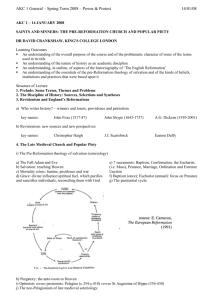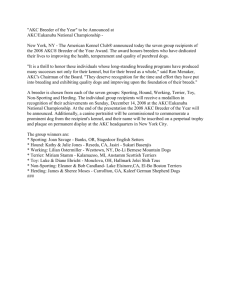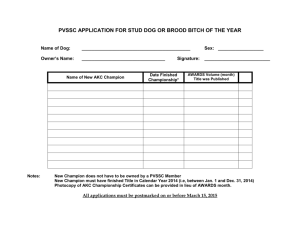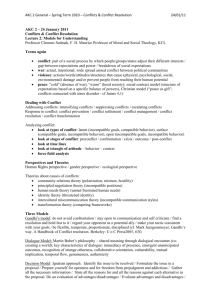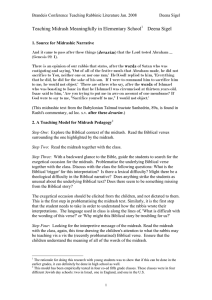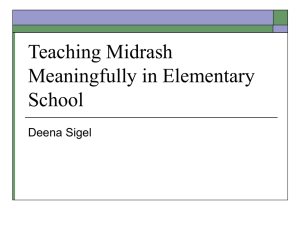Lecture 3 - King`s College London
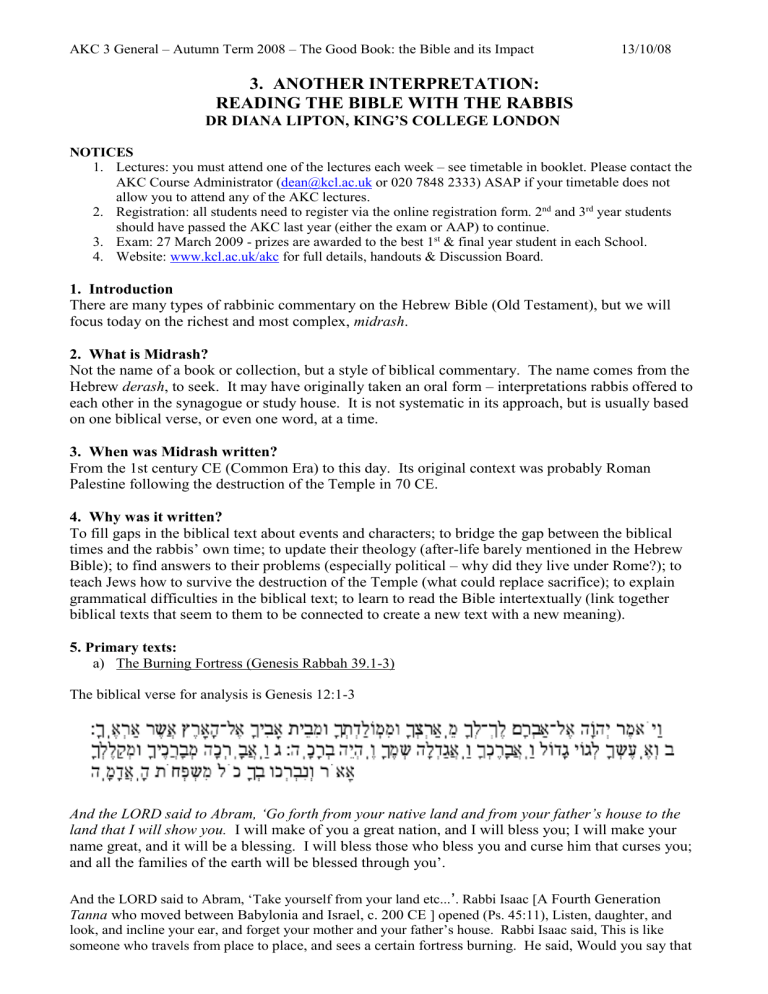
AKC 3 General – Autumn Term 2008 – The Good Book: the Bible and its Impact 13/10/08
3.
ANOTHER INTERPRETATION:
READING THE BIBLE WITH THE RABBIS
DR DIANA LIPTON, KING’S COLLEGE LONDON
NOTICES
1.
Lectures: you must attend one of the lectures each week – see timetable in booklet. Please contact the
AKC Course Administrator ( dean@kcl.ac.uk
or 020 7848 2333) ASAP if your timetable does not allow you to attend any of the AKC lectures.
2.
Registration: all students need to register via the online registration form. 2 nd and 3 rd year students should have passed the AKC last year (either the exam or AAP) to continue.
3.
Exam: 27 March 2009 - prizes are awarded to the best 1 st & final year student in each School.
4.
Website: www.kcl.ac.uk/akc for full details, handouts & Discussion Board.
1. Introduction
There are many types of rabbinic commentary on the Hebrew Bible (Old Testament), but we will focus today on the richest and most complex, midrash .
2. What is Midrash?
Not the name of a book or collection, but a style of biblical commentary. The name comes from the
Hebrew derash , to seek. It may have originally taken an oral form – interpretations rabbis offered to each other in the synagogue or study house. It is not systematic in its approach, but is usually based on one biblical verse, or even one word, at a time.
3. When was Midrash written?
From the 1st century CE (Common Era) to this day. Its original context was probably Roman
Palestine following the destruction of the Temple in 70 CE.
4. Why was it written?
To fill gaps in the biblical text about events and characters; to bridge the gap between the biblical times and the rabbis’ own time; to update their theology (after-life barely mentioned in the Hebrew
Bible); to find answers to their problems (especially political – why did they live under Rome?); to teach Jews how to survive the destruction of the Temple (what could replace sacrifice); to explain grammatical difficulties in the biblical text; to learn to read the Bible intertextually (link together biblical texts that seem to them to be connected to create a new text with a new meaning).
5. Primary texts: a) The Burning Fortress (Genesis Rabbah 39.1-3)
The biblical verse for analysis is Genesis 12:1-3
And the LORD said to Abram, ‘Go forth from your native land and from your father’s house to the land that I will show you.
I will make of you a great nation, and I will bless you; I will make your name great, and it will be a blessing. I will bless those who bless you and curse him that curses you; and all the families of the earth will be blessed through you’.
And the LORD said to Abram, ‘Take yourself from your land etc...
’
. Rabbi Isaac [ A Fourth Generation
Tanna who moved between Babylonia and Israel, c. 200 CE ] opened (Ps. 45:11), Listen, daughter, and look, and incline your ear, and forget your mother and your father’s house. Rabbi Isaac said, This is like someone who travels from place to place, and sees a certain fortress burning. He said, Would you say that
AKC 3 General – Autumn Term 2008 – The Good Book: the Bible and its Impact 13/10/08 this fortress has no overseer? Above him, the overseer of the fortress peeked out. He said to him, I am he, the overseer of the fortress. Thus it was when our father Abraham said, Would you say that this world has no overseer? the Holy One Blessed be He peeked out over him and said, I am He, the Master of the World. So shall the King desire your beauty, for he is your Lord. So shall the King desire your beauty. To beautify you in the world. And to bow down to him. Hence, And the LORD spoke to Abram. b) The Two Wrestlers (Genesis Rabbah 22.9)
Commenting on ‘Your brother’s blood cries out to me from the ground’ (Gen. 4:10)
It is like two athletes standing and wrestling before the king. Had the king wanted to separate them, he could have done so. But the king did not wish to separate them. One overwhelmed his companion and killed him. He cried out [as he was dying], ‘Who will bring my case before the king?
’
Thus, The voice of your brother’s blood cries out to me from the ground. c) The angel Metatron finds God crying over the death of Moses ( Midrash Tanchuma [Buber],
Deuteronomy , p. 13)
Metatron came at that time, and fell on his face. He said to Him, ’Master of the Universe, Moses’ life was in your hands and his death was in your hands.’ The Holy One Blessed Be He said, ’Let me tell you a parable. What is this matter like? It is like a king who had a son. Time after time his father became angry with him and wanted to kill him, because he did not honour his father, but his mother used to save him from his [father’s] hand. One day his mother died and the king wept. His servants said to him, “Our Lord king, why are you weeping?“ He replied, “I weep not only for my wife, but for my son. So many times I have been angry at him and wished to kill him, but she saved him from my hand“.’ ’So too’, said the Holy One Blessed Be He to Metatron, ’I weep not just for Moses but for Israel. How many times have they provoked me and I was angry at them, but he stood before me in the breach to turn back my anger from destroying them.’ d) Lamentations Rabbah 3.21 on God
’ s apparent absence following the destruction of the Temple
R. Abba bar Kahana said: It is like a king who married a woman and wrote her a large marriagesettlement ( ketubah ). He wrote to her: So many bridal chambers am I building for you; so much jewellery I make for you; so much gold and silver I give you. Then he left her for many years and journeyed to the provinces. Her neighbours used to taunt her and say to her: hasn’t your husband abandoned you? Go! Marry another man. She would weep and sigh, and afterward she would enter her bridal chamber and read her marriage-settlement and king returned. He said to her: I am amazed that you have waited for me all these years! She replied: My master, O king! If not for the large wedding-settlement you wrote me, my neighbours long ago would have led me astray.
Further reading
B.W. Holtz, Midrash in B.W. Holtz (ed.), Back to the Sources (New York: Summit Books, 1992),
Ch. 3.
D. Stern, Parables in Midrash. Narrative and Exegesis in Rabbinic Literature (Cambridge MA:
Harvard, 1991/94).
Full details about the AKC course, including copies of the handouts, can be found on the AKC website at: http://www.kcl.ac.uk/akc . Please join in the Discussion Board and leave your comments.
If you have any queries please contact the AKC Course Administrator on ext 2333 or via email at dean@kcl.ac.uk
.
The AKC Examination will take place on Friday 27 March 2009 between 14.30 and 16.30.
YOU MUST REGISTER FOR THE COURSE using the online form on the website. You will need to register for the exam separately, information will be provided next semester.
